Bonus Perspectives: 2024 in Review
My personal growth, my ten best pieces, and my favorite media I experienced this year.
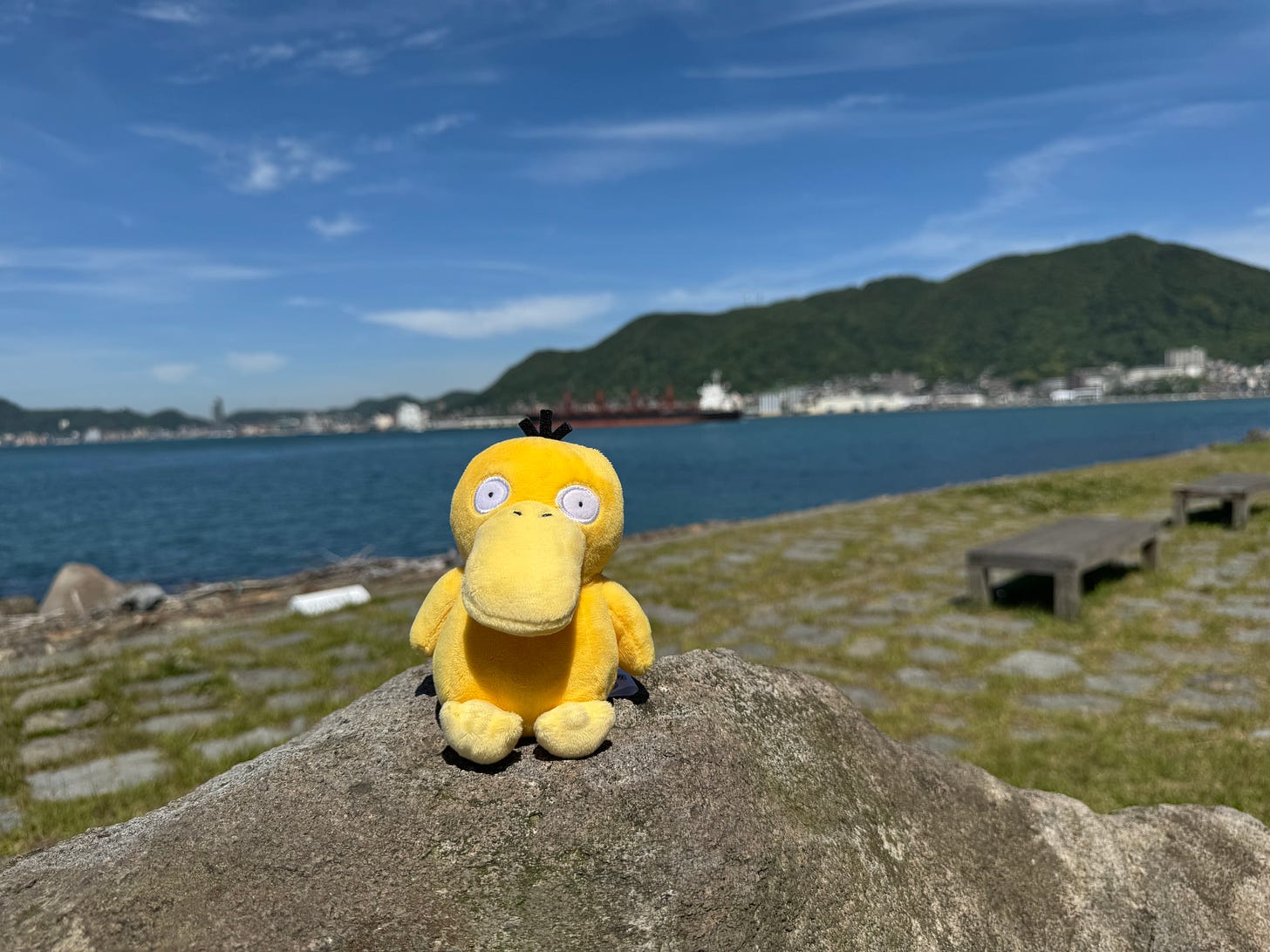
Bonus Perspectives is a weekly column series containing my thoughts on the latest international news and Japanese news, as well as film, television, music, book, and video game recommendations. It’s free for all subscribers to this Substack, but if you enjoy my writing, consider opting for a paid subscription. Doing so will give you access to exclusive in-depth pieces and my entire backlog of work. Your support is greatly appreciated!
Take 20% off from now until the end of January.
A look back on 2024
2024 felt like the equivalent of multiple years jammed into one. Compared to any other year I’ve lived in Japan since my second move in 2019, I accomplished more than I could have ever anticipated and subsequently laid the important groundwork for a future path I’m excited to embark upon. Outside of my own life, it seemed that nearly every month gave us a once-in-a-century kind of event that completely changed the landscape for geopolitics and culture.
In a way, you could say that 2024 paradoxically went by in a flash, but that it also moved by at a methodical place because of the sheer amount of things that happened. While writing this piece and revisiting this year’s events, I nearly forgot that the Paris Olympics were held or that Oppenheimer swept the Oscars. I had to remind myself that important stuff I did during the first half of 2024 actually happened this year and not in the last couple of years because of the way my life radically changed. That should give you an idea of how much my sense of time has been warped, but let’s not get ahead of ourselves.
For starters, 2024 was the first full year of this Substack. I began Foreign Perspectives in May 2023, which frankly seems like a lifetime ago considering all the alterations this website has gone through since then. There was less focus of what I wanted to do in the beginning other than covering my general interests, which ranged from life in Japan to The Young Indiana Jones Chronicles. This year, however, I began my weekly column Bonus Perspectives which allows me to assemble my thoughts on various news stories and pieces of media in a more digestible way. Subscribers can read the whole thing or pick and choose what sections interest them. That column too went through its own changes, but at this point I think I’ve reached a concise format that I will continue in 2025.
I unfortunately fell short of my goal to reach 1,000 subscribers by the end of 2024, but I’m still very happy with the amount of growth among both free and paid subscribers over the last 12 months. I think the real issue of not crossing my intended milestone came down to consistency, which I apologize for not always being on top of. For most of November and December, I unexpectedly became ill which normally doesn’t happen. That in turn was the result of me taking a very demanding part-time job which requires standing outside for long hours. Given the cold temperatures and sheer amount of customers I have to interact with, it would have been surprising if I didn’t get sick.

Some are aware of what job I’m working, but strict NDAs prevent me from revealing much more at this time. Either way, I will be done with it by the end of January and will switch completely to freelance writing, so expect greater consistency and an increase in articles overall. I also accomplished more bylines than ever before, some of which have lead to exciting writing gigs. Your support of this Substack, however, is essential for keeping this whole enterprise going, so do consider a paid subscription if you enjoy my articles.
Being featured in The Japan Times, UnHerd, Quillette, and The Spectator were all major milestones for my writing career as I continued my PhD in international relations. Reaching the third year of my doctoral program marked the end of my scholarship funding, but I was able to successfully extend my student visa. Working on this thesis will become my main priority in 2025, and I now I have a concrete timeline of when I hope to graduate. If all of that wasn’t enough, I also got married. I would recommend reading my article on dating in Japan for more insights on how I reached this point, but needless to say this marks a new chapter for my life in this country.
Another moment of personal growth, or should I say shrinkage, was me dropping over 18 kg (40 lbs) of body weight. At the end of last year I weighed in at around 104 kgs (230 lbs), which was the heaviest I had ever been. I never intended to get that big, but it was the result of me attempting to “dirty bulk” while doing strength training for the first time throughout 2023. I ate more to increase my daily protein intake, but didn’t really track calories. While I learned a lot about lifting weights properly and made some tangible gains, the amount of body fat on me was not worth what little muscle I had developed. Not to mention that I had basically stopped all cardio, which was unusual for me as I had previously been a regular runner.
Looking at pictures of myself in early 2024 was enough for me to realize that a major change was needed. Unfortunately, that also coincided with me going back to the United States for the first time in over three years. People I hadn’t seen in ages could tell I had put on weight while I also had to make sure I didn’t make things even worse with how notoriously calorie dense American food is. As soon as I got back to Japan in late February, I started cutting calories and moving more. It was a slow process in the beginning, but gradually my face returned to what it once was and I’m no longer as embarrassed to be on camera anymore.
By the summer I was back to jogging regularly and I decided that I wanted to try my hand at running 5Ks. My time in August was 33 minutes, but I was able to cut it down to 27 minutes by November. I had intended to get down to 25 minutes by the end of the year, but unexpectedly becoming sick for weeks means I had to delay that goal to early 2025. I’ve realized that I prefer running to lifting weights and that a bodybuilder physique isn’t want I want. I’m aiming to get back to a runner’s body and while I still have some weight to lose, I’ve already gotten over the hard part. I intend to also reincorporate regular weight training, but this time build muscle the correct way with a clean bulk. Hopefully I can report back with my progress this time next year. My fitness journey is only just beginning.
I could continue this section with a recap of all the big world events that happened in 2024 if I wanted to, but I think I’ve gone on for long enough. This is meant to be the final entry of Bonus Perspectives for 2024 and I won’t waste any more of your time. Instead, I’ve assembled a collection of what I think is my best writing, in addition to movies I watched, music I listened to, books I read, and video games I played this year. It wouldn’t be Bonus Perspectives without some media recommendations, now would it?
I wish all my readers good times with family members and loved ones as we enter 2025. Whether you are a new or regular subscriber to Foreign Perspectives, I’m nothing but eternally grateful that you’ve chosen to have my words reach your inbox every week. Let’s continue to visit new places together.
—Oliver Jia
My ten best pieces
“AI is Not the Solution to Bad Translations of Japanese Media” — Foreign Perspectives
One of my first pieces of 2024, I did a long-form deep dive into translation and localization of Japanese media, as well as the controversy over the use of AI. Like many topics on Twitter (or X as we’re being increasingly forced to call it), this has become embroiled in a heated culture war with two sides largely talking past each other. I wanted to write something that could provide some nuance over the complicated subject of language translation, as well as why AI is a creative dead end that won’t solve the problems some seem to think it will. Even if you have no interest in video games or anime, the implications of AI on art are too serious to ignore.
“The truth about retro game hunting in a post-pandemic Japan” — Time Extension
I wrote this piece after going viral on Twitter when I posted pictures of a Surugaya store in Kyoto that previously had fully stocked shelves of reasonably priced retro video games, but is now a hollow shell of its former self. My tweets were featured on the video game enthusiast site Time Extension and ended up becoming part of larger discourse over how much the landscape for retro game collecting has changed in Japan. I reached out to the site editor Damien McFerran pitching a piece that could provide some more context and he was happy to oblige. I hope to do more work with them in the future, but in the meantime I appreciated being able to get my thoughts out to their readers.
“Why Japan won’t repeat the West’s mistakes on immigration” — The Spectator
Another contentious topic that is poorly understood by Westerners and plagued with false information on Twitter. Having been a contributor to The Spectator since 2023, I thought that they would be the perfect platform for me to write an article about immigration to Japan. The piece had to go through a couple of minor corrections after publication, but I’m ultimately glad with how it turned out because it serves as my go-to word on a complicated subject that few outside of Japan really know anything about. Writing this piece was also one factor that eventually pushed me to radically change how I used Twitter in 2024. Instead of getting into pointless online arguments, I decided to channel that energy into writing more articles. I get paid to do it and I can avoid the exhausting drama of social media. Win-win.
“The forgotten impact of 9/11 on Japan” — The Japan Times
9/11 is a topic I’ve previously discussed on Foreign Perspectives, but this was both my first time writing about it for a professional publication and my debut piece overall for The Japan Times. Much like many other things that capture my interest, I’ve dedicated so much digital ink to 9/11 because I think it’s poorly understood by the general public. Even more than that, 9/11 is now at the risk of being forgotten entirely by generations too young to have any conscious memories of it. In this case, I chose to shed light on the rarely-discussed Japanese perspective around the event. 24 Japanese nationals lost their lives in the terrorist attacks, including two victims who were on board the planes. Moving forward, I intend to continue finding these lesser-known angles when I write future pieces about 9/11. There is still plenty to cover as we approach the 25th anniversary.
“Five Years in Kyoto” — Foreign Perspectives
2024 marked five years since I first moved to Kyoto for my graduate studies, so I believed that a retrospective piece looking back on my life throughout that time was in order. Most associate the city as being a tourist trap with maddening crowds, but I chose to focus more on the quieter aspects as a full-time resident. These are the kinds of pieces that come easiest to write for me as I’m really just discussing normal daily life. But for those outside of Japan who want to learn more about the country, what’s mundane to me is a foreign perspective to others. See what I did there? Never mind.
“The return of CRT TVs” — The Spectator
Currently my last piece for The Spectator since their buyout, but I’ve been reliably informed that it won’t actually be my last despite the change in editorial leadership. We’ll see what I can get published there in 2025. Regardless, this is arguably my favorite piece I’ve written for them. You remember those old, bulky box televisions your boomer parents or grandparents stubbornly never got rid of? Well make sure they still have them because there’s a decent chance they’re sitting on gold for retro gamers and enthusiasts of esoteric technology. Why would anyone possibly want one in the age of 4K flatscreens? That’s what my piece is about and I was thrilled to have the opportunity to interview some of the few people in the world still repairing these television sets. I only wish I had gotten my own CRT years ago instead of now when the prices are being jacked up by sellers who are now aware of what they have.

“Decline and Folly” — Quillette
Why do some critically acclaimed directors fall from grace? How could the man behind The Godfather and Apocalypse Now also be responsible for Jack and this year’s disastrous release of Megalopolis? In my debut piece for the Australian magazine Quillette, I answer these questions and more while analyzing why Francis Ford Coppola’s lifelong passion project largely failed in what it set out to do. Because Quillette has such high standards and what they were asking for was quite different from what I originally submitted, this was probably the hardest piece I wrote this year. Still, we managed to work through it after a second draft and the final result captured the ideas I intended to convey. Now that I’m more familiar with their style, I hope to do future deep dives into other directors and pieces of pop culture I’m passionate about in 2025.
“North Korea is ready for war” — UnHerd
Around the same time I was drafting my Megalopolis piece for Quillette, the British magazine UnHerd reached out to me for an analysis of North Korea’s role in the ongoing war between Ukraine and Russia. It had been over a year since I last wrote any kind of North Korea-related analysis, so this was going back to what was once my bread and butter. UnHerd told me that my previous contributions for NK News were what got them interested in having me join their site, so that should tell you how important it is to build a CV of articles as soon as you can. With everything else going on in the world, North Korea has not been at the same level of public interest compared to previous years, hence why I don’t actually discuss it much despite it being the subject of my PhD. With Donald Trump set to return to the White House in 2025, however, I suspect that we will hear more from the Kim regime than usual. You can expect more analysis from me if and when that happens.
“A Personal Journey Through Japan Part 2: Yamaguchi” — Foreign Perspectives
As the title suggests, this was perhaps my most personal writing of the year. A few months after I returned from visiting the United States, I decided to revisit places in Japan that held particular significance for me. After sorting out my thoughts and working on other pieces for most of 2024, I decided that this trip would be best suited for a three-part column series. The first was about Yokosuka, while this one was about Yamaguchi Prefecture, a very underrated part of Japan and the first region of the country I ever lived in. As such, it carries a lot of importance. Going back reminded me of a time when I was younger and more naive, but also perhaps more free than I ever will be for the rest of my life. This year’s trip taught me a lot about myself and what role nostalgia plays in shaping us, but that we eventually have to move on. And speaking of which, stay tuned for Part 3 in January.
“Why Christmas Eve is date night in Japan” — UnHerd
I closed the year with my latest piece for Unherd, an essay about the history of Christmas and Christianity in Japan. Despite less than 1% of the country identifying as Christian, the Yuletide season is still a huge cultural phenomenon for the people of Japan. So if you’ve ever wanted to learn why the Japanese eat KFC on Christmas, why Christmas Eve is considered the most romantic day of the year for customers, and how a surprising amount of prime ministers have been Christians, considering reading this piece over your holiday break. After writing about heavy topics like 9/11 and North Korea, it was certainly nice to end the year with something light.
What I watched

God, what a disappointing year for cinema. While according to my Letterboxd I watched about 170 films, less than ten of them were movies actually from 2024 because there was so little of interest on offer. And out of those, the majority of them were sequels. I enjoyed Furiosa: A Mad Max Saga, but as I wrote earlier this year, its failure at the box office leaves the future of George Miller’s post-apocalyptic franchise on ice for the time being. Deadpool & Wolverine was an enjoyable superhero comedy, but it’ll most likely just be a one-off instead of something that will save the MCU altogether.
Alien: Romulus was fine and probably the best film in the franchise since James Cameron’s Aliens. Its attempts at nostalgia-bait, however, represent the worst excesses of Hollywood in the 2020s pandering in order to get butts in seats. I only saw Venom: The Last Dance because my wife wanted to, but I’ll be kind and call it a guilty pleasure like the other Venom movies. You’ll forgive me for not watching Madame Web or Kraven the Hunter. Gladiator II was ok, but a pointless retread of its vastly superior predecessor. I think Megalopolis is worth watching, not because it’s good, but because nothing like it has ever been made. Read my aforementioned piece on it.
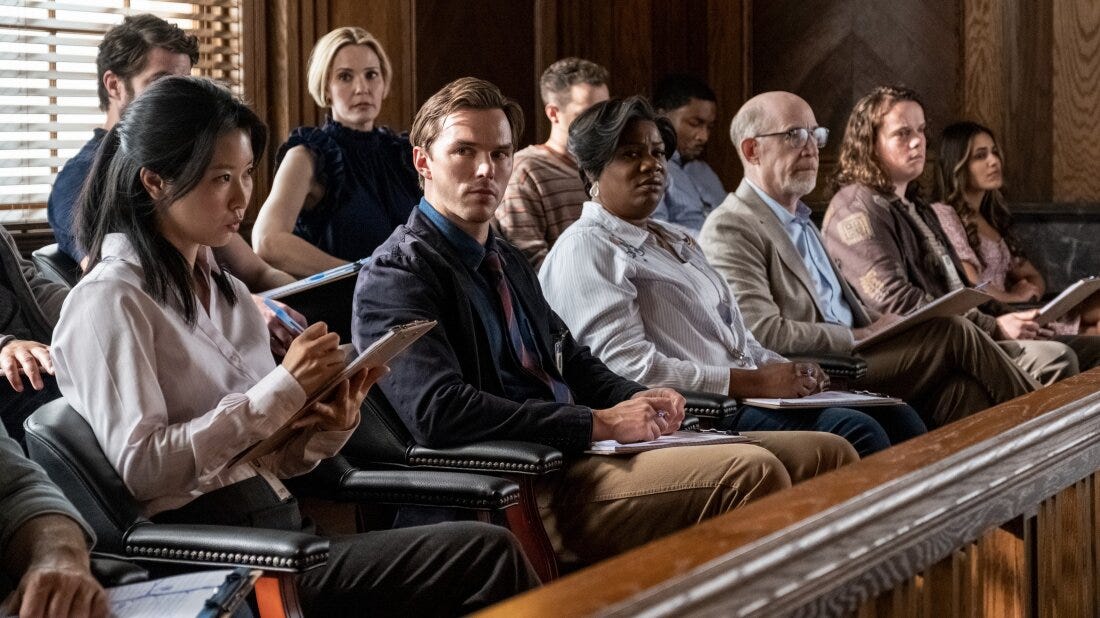
If I had to choose one film from this year that was actually my favorite, it would be Juror #2. Possibly Clint Eastwood’s swan song (the man is 94 years old!), this is an old-fashioned courtroom drama that poses thought-provoking questions around the law, jury bias, human flaws, and other themes that most films today seem to have no interest in exploring. In fact, this is a movie that doesn’t really get made anymore. In the 1990s and early 2000s long before streaming completely changed the game of commercially viable films, you would have seen a small-scale drama like this every week at the cinema. Today though, such works are perceived as no longer profitable, which is why Warner Brothers essentially killed Juror #2 by cutting its theatrical release short and putting it on streaming. Clint Eastwood deserves so much better.
As I live in Japan, film releases often get delayed here. I’m excited for The Brutalist and Nosferatu, but those won’t be out for me until later in 2025. Ironically enough, some of the best stuff I saw were films from 2023 that were given theatrical releases in Japan in 2024. Oppenheimer is of course Christopher Nolan’s latest masterpiece and fully deserving of all its acclaim. Not much more needs to be said except for the fact that I always knew it would be released in Japan and that the invented controversy around it was overblown.
I found Celine Song’s directorial debut Past Lives heartbreakingly beautiful, especially as someone who has dealt with unsuccessful long distance relationships. The Bikeriders with Austin Butler and Tom Hardy was excellent. Like Juror #2 it’s a kind of movie I’m surprised was ever made in this day and age. It has a surprisingly conservative outlook on 1960s liberal radicalism, but also good commentary on destructive masculinity that manages to not be preachy or sentimental. If there was one film from 2023 I was most looking forward to seeing, it was Michael Caine’s final role in The Great Escaper. See my review here.
Other than that, 2024 had some really slim pickings for interesting films. If I missed anything, feel free to let me know in the replies and I’ll try to get to it depending on if it’s available in my neck of the woods. The year was instead largely a time for me to catch up on my backlog of important films I had yet to see or an opportunity to revisit stuff to show to my wife, such as Quentin Tarantino’s filmography and the Lethal Weapon films. My Letterboxed shows a wide diversity of different works, so it was a productive year of cinematic education indeed. It’s impossible for me to talk about all of them, so here are my 15 favorites with a brief remark on each. I saw all of these for the first time.
True Romance (1993) — A beautiful collaboration between Tony Scott and Quentin Tarantino. Entertaining from start to finish with tight writing and stellar performances. Glad that Scott was able to get his happy ending over Tarantino’s intended dour conclusion.
Saturday Night Fever (1977) — A case where the soundtrack is vastly more popular than the film itself, but that shouldn’t dissuade you from seeing this one. John Travolta’s dance choreography is still breathtaking even today. The story is much darker than most modern viewers are probably expecting and some of the content is uncomfortable to watch, but one should go in with the mentality that this is closer to Mean Streets than it is Grease.
Where Eagles Dare (1968) — The quintessential 1960s war film that would inspire decades of cinema to come, including Quentin Tarantino’s Inglourious Basterds. While showing my wife his films, I wanted to also show her his influences. This was the first time I saw it myself, but I instantly clicked with it. Richard Burton and Clint Eastwood are fantastic. Despite the limitations of the era, you still feel the scale of their mission and the coldness of the snowy Bavarian castle setting.
Royal Space Force: The Wings of Honnêamise (1987) — A Japanese animated film that should be in the same conversation as Akira and Ghost in the Shell, but unfortunately was neglected for years and is seldom seen outside of Japan. Hardcore enthusiasts for mech anime have always sung its praises and the film succeeds in being a beautiful masterpiece despite its production issues. Was lucky to later find a copy of the stirring electronic score by Ryuichi Sakamoto on vinyl.
Metropolis (1927) — Not much to say that hasn’t been said already. Without Fritz Lang’s Metropolis you don’t get Ridley Scott’s Blade Runner, Terry Gilliam’s Brazil, or any world-building piece of cinema where the city itself is a character. This film is nearly 100 years old, but you quickly forget that because of how it sucks you in with its beautiful set design and mesmerizing attention to detail. In 1927, there would have been nothing like it. Today, there arguably still is nothing like it.
The Great Silence (1968) — Another movie I saw for the first time as part of my Tarantino filmography and his inspirations marathon. This is probably one of the most underrated westerns ever made because of its troubled release history outside of Italy, but its reputation has thankfully improved over the ensuing decades. Tarantino heavily borrowed the winter setting for Django Unchained and The Hateful Eight, but he would fully admit that no one could do it better than Sergio Corbucci. With the likes of Klaus Kinski in the cast and a haunting score by Ennio Morricone, The Great Silence is truly worthy of being called a hidden masterpiece.
The Death of Stalin (2017) — Top-notch political satire which is a rarity these days. See my review here.
Get Carter (1971) — For me, 2024 was the Year of Michael Caine because I spent most of it seriously diving into his filmography from the beginning. I plan on dedicating more articles to his life and work, but for the time being I think my favorite film of his is Get Carter. Most today only associate Caine with kindly elder roles, but Mike Hodges’ 1971 British gangster picture shows him at his most brutal. It pushed the limits of what was acceptable in mainstream Anglosphere cinema at the time and later crime films owe a ton of inspiration to it. Caine is impeccable as Jack Carter, his performance being up there with Alfie and Harry Palmer. Roy Budd’s minimalistic score is constantly played in my music library.
Mr. Smith Goes to Washington (1939) —Frank Capra’s therapeutic idealistic balm we all need in today’s extremely polarized world. See my review here.
Gladiator (2000) — Yes, I know I should be crucified for not having seen Gladiator until now. I should also be hung, drawn, and quartered for it taking me until the release of Gladiator II to watch it. Now that my punishment is over, all I can say is that this is an exceptional masterpiece and one of the last great modern epics from Hollywood. The absence of Russell Crowe in the sequel really shows why the original Gladiator was lightning in a bottle and something that not even Ridley Scott himself could do again better. I look forward to rewatching this one many times over the next few years. Also, one of Hans Zimmer’s finest scores.
The Green Mile (1999) — After rewatching The Shawshank Redemption for the first time in over a decade, I decided to finally check out its spiritual successor The Green Mile, which is also based on a Stephen King story. Few films deserve to be over three hours long, but The Green Mile earns its runtime. Frank Darabont knows how to pull you in with characters you either immediately love or hate, which is why you stay invested. If Shawshank was a prison drama about the prisoners, The Green Mile is a companion piece from the guards’ perspective. It’s from the old days of Hollywood when star power and good writing were enough to draw audiences in. I wish Darabont was able to do more afterward, but that’s a topic for another day.
Death Wish (1974) — Ok, I needed to include at least one schlocky film on this list. I previously wrote about how I read Brian Garfield’s 1972 novel Death Wish in early November, but had yet to see the cinematic adaptation starring Charles Bronson. At the time I suspected that it would bear little resemblance to the book given that Bronson is completely different from Garfield’s timid accountant protagonist and boy was I right. Still, that didn’t prevent me from the Death Wish film and its sequels being among my biggest guilty pleasures of the year. Do these movies express ideological themes that would likely never work in the real world? Yes, but that’s not really the point. Given how poorly-received the 2018 Bruce Willis remake was among mainstream critics, I plan on doing an in-depth piece on the complicated legacy of Death Wish and why these films are worth watching again.
Love Actually (2003) — A sweet romantic comedy perfect for people who don’t like romantic comedies. See my review here.
Sleuth (1972) — Along with Get Carter, this is one of the best examples of Michael Caine’s incredible range. Even though it came out just one year after Mike Hodges’ film, Sleuth gives us an entirely different side of Caine via a complex role that keeps the audience in utter suspense. The other important aspect is Laurence Olivier, but it would be an utter disservice to spoil anything further. Go into this one knowing as little as possible and you’ll thank me later. Sleuth received a gorgeous HD restoration this year via a new Japanese Blu-ray, but it’s been tangled in convoluted legal issues overseas for decades. Someone has uploaded to YouTube, so give it your full attention while you still can.
Airplane (1980) — Another film that I know I deserve to be lynched for not seeing until now. I already knew many of the famous jokes of course, but watching them in full context had me grinning ear to ear the entire time. Airplane fully deserves its reputation as being one of the best comedies of the 20th century, with its pre-9/11 aviation humor serving as a reminder of why it can never be remade in this era. I’d tell you to watch it, but surely you already have. So watch it again and don’t call me Shirley.
What I listened to
As readers of my weekly column Bonus Perspectives are aware, I regularly recommend music. Here are some highlights of the best stuff I listened to this year.
Billy Joel — I don’t think I have to elaborate on what makes Billy Joel so great because he’s been an American cultural staple for the last 50+ years. Going through his entire discography in 2024 gave me a new perspective on how much he’s evolved as an artist. Everyone knows how great “Piano Man” and “Uptown Girl” are, but there really is something for all kinds of listeners due to his willingness to be flexible, but not pandering toward each passing era of music. Album-wise, The Stranger is his undisputed masterpiece, but An Innocent Man and his later output are underrated. Yes, I’m an unapologetic “We Didn’t Start the Fire” fan.
Sandy Lam — Hong Kong during the 1980s and 1990s produced some of the world’s finest films and music. An era of unprecedented creative freedom before mainland China regained control of the island colony, it was the days of John Woo, Wong Kar-wai, and Leslie Cheung. But while those names are well-known in the West, singer Sandy Lam’s popularity has largely been limited to Hong Kong and neighboring Asian countries. I first came across her work via Wong Kar-wai’s debut film As Tears Go By, which features Lam singing a gorgeous Cantonese cover of “Take My Breath Away.” From there, I began going through her discography via Apple Music and she has since become a regular fixture of my listening library.
Kookie Freedman — A very obscure German composer you’ve never heard of, but let me explain. You know those non-invasive pieces of background music you often hear in department stores and shopping centers? The kind of stuff that’s usually dismissed as “elevator music” because of how low-key it is? Well here’s the thing, I actually like that stuff. I don’t necessarily make it my first choice of listening material for the evening, but when it comes to needing an aural backdrop while I’m working or studying? I fire up Kookie Freedman’s expansive library of jazz tunes and easy listening for inspiration. Put on this playlist the next time you need to get something done and you’ll understand what I mean.
Saturday Night Fever — What got me into the aforementioned film. Come on, it’s the Bee Gees. What else do I need to say?

Starsailor — Post-Britpop group that made the kind of acoustic soft rock that was huge in the early 2000s, but is now ironically considered a breath of fresh air compared to the manufactured junk put out by music labels today. See my overview of their work here.
Atarashii Gakko! — Despite living in Japan, I don’t listen to much J-pop. I’ll add a song to my library here and there usually if it’s in a show or film I happen to come across, but I’m generally not a big fan of modern Japanese pop music largely for the same reasons I don’t care for modern American pop music. Still, Atarashii Gakko! is an exception. They’re clearly aimed at Gen Z Japanese youths and their overly perky vibe won’t be everyone’s cup of tea, but I consider them a guilty pleasure. Their music videos such “Otona Blue” and “Pineapple Kryptonite” are genuinely entertaining for their impeccable choreography and good use of retro aesthetics.
Mono — Another obscure act you’ve probably never heard of, but don’t worry, they’re anything but elevator music produced by esoteric German composers. Formica Blues is the only album the short-lived English trip hop duo ever produced, but I constantly go back to it for the sheer amount of sampling on display. Nothing like it has ever been made since. See my review here.
Isaac Hayes — He’s best known for Shaft of course, but I’ve recently been going through his other work. “Walk on By” from Hot Buttered Soul is 12 minutes of pure auditory bliss and among the best examples of soul music ever made. It’s no wonder why Mono sampled it in Formica Blues.
Roy Budd — One of the most underrated film composers of the 20th century and responsible for the music in some of Michael Caine’s best films. The theme to Get Carter will never leave my head.
Classical music recommendations — See my write-ups on Prokofiev and Brahms.
What I read

I got a Kindle Paperwhite at the end of 2023 and it completely changed my approach to reading books. While I will always love the look and feel of my physical book library, having a small tablet in my backpack with dozens of books instantly accessible on a paper-like screen that doesn’t strain my eyes gave me less excuses to avoid reading in 2024. I didn’t read as much as I wanted to because of other commitments, but next year I hope to put aside at least one hour every day completely dedicated to books. Here were my favorites I read this year.
102 Minutes: The Untold Story of the Fight to Survive Inside the Twin Towers by Jim Dwyer and Kevin Flynn — I’ve read a lot of books on 9/11, but 102 Minutes is my first recommendation for anyone who wants to learn the essentials of what happened on the worst day in U.S. history. As its title implies, Jim Dwyer and Kevin Flynn provide a precise run-down of the events that occurred between the hijacked planes hitting the Twin Towers and their eventual collapse. It may not make for light reading, but everyone should be required to learn what 9/11 was so “never forget” is more than just a slogan.
Bad Man by Dathan Auerbach — A compelling thriller about a missing child that takes inspiration from the “creepypasta” stories of 2010s internet forums, but stands alone as a well-written slow burn novel. See my review here.
The Quiet American by Graham Greene — A classic novel warning of U.S. involvement in Vietnam that accurately predicted much of what would go wrong. Greene is more left-leaning than I am, but his talents for crafting a good yarn should be obvious to anyone. Few in his day were able to smoothly combine journalistic skills with fiction-writing ones. I hope to follow in his footsteps one day. Until then I look forward to reading more of his work. See my review here.
The Hitchhiker’s Guide to the Galaxy by Douglas Adams — One of the funniest things I read all year and an effective parody of the sci-fi genre. Best consumed via the audiobook narrated by the great Stephen Fry. See my review here.
The Ipcress File by Len Deighton — A spy novel that intentionally shows the drudgery and mundane aspects of spycraft. Deighton’s protagonist in The Ipcress File was originally unnamed, but would later be called Harry Palmer in the excellent film adaptation starring Michael Caine. While both the 1965 movie and the overlooked 2022 television mini-series remake do an admirable job in adapting the material, you really do want to read the original book to appreciate all of Deighton’s subtleties. Like Graham Greene, I hope to read more of his work in 2025. See my review here.
Death Wish by Brian Garfield — A novel that’s closer to old pulp fiction stories of guns and violence than it is high literature, but that’s likely what Brian Garfield was aiming for. Very different from the Charles Bronson series of films, but worth reading for the interesting questions around law enforcement it raises. The sequel Death Sentence is necessary to get the entire story. See my review here.
Hard Truths: Think and Lead Like a Green Beret by Mike Waltz — Regardless of your own politics, Congressman Mike Waltz’ memoir is an insightful look into the lives of Green Beret soldiers and the difficult problems they have to deal with while deployed abroad. There are a lot of controversies over Trump’s picks and nominations for his cabinet, but when it comes to the position of national security advisor, I’m confident that Waltz will be well-suited for the role. See my review here.
The Railway Man by Eric Lomax — An incredible memoir of a British Army officer who experienced horrific treatment at the hands of the Japanese as a POW during World War II. Eric Lomax writes of his journey from being an innocent train enthusiast as a boy in Scotland to ironically being forced to build the Burma Railway in one of the worst instances of Japanese war crimes. But his book is also a tale of reconciliation with how Lomax was able to overcome his hatred of Japan and make amends with one of his former torturers. As WWII gets further and further away from public memory, stories like those of Eric Lomax’s are a reminder of how much previous generations sacrificed to get us to the free societies we live in now. I didn’t cover The Railway Man in my Bonus Perspectives column because I want to give this man’s amazing story the full write-up it deserves. Yet another thing for me to get to in 2025.

The Lost City of Z: A Tale of Deadly Obsession in the Amazon by David Grann — I’m a huge fan of Indiana Jones, but did you know that someone very similar actually existed in real life? The Lost City of Z is a non-fiction book that covers the life of Percy Fawcett, the last notable explorer of the 20th century who made his mark visiting the most remote places on earth. In 1925, Fawcett and his expedition disappeared into the thick jungles of South America looking for the remains of a lost civilization. What happened to him remained a total mystery and dozens of others met gruesome fates trying to find out the truth. While I normally don’t care for authors inserting themselves into the memoirs of their subjects, in this case David Grann’s own quest in going after Fawcett’s last known location is just as compelling as the man whose biography he’s writing. No spoilers from me, but this one is a page-turner.
The Sympathizer by Viet Than Nguyen — I have yet to see the HBO television adaptation starring Robert Downey Jr. because I wanted to read the original novel first. Viet Than Nguyen’s The Sympathizer dives into the complexities on both sides following the end of the Vietnam War in 1975. Told in first-person, the protagonist is a double agent working for the North Vietnamese communists. We as the readers are thus subject to every single one of his internal monologues which can make the novel feel long-winded at times, but Viet has a gift for language that makes you want to keep going. Like with Graham Greene, there’s a lot with Viet’s worldview that I disagree with, but I still found The Sympathizer to be a thought-provoking read which offered a unique perspective rarely seen in Vietnam War-related literature.
What I played

Despite being a hardcore video game enthusiast, 2024 probably marked the year when I played the least amount of titles because of everything else I had to do. I regret to report that I may possibly be starting to become a productive member of society. In any case, while my wife sunk in hundreds of hours into Elden Ring and other Soulslike games via our PlayStation 5, the system was more or less just a 4K UHD Blu-ray player when in my hands. Now that I’m about to greatly reorganize my overall life structure though, 2025 will hopefully give me more time to play. Here’s what I was able to get to in 2024.
PaRappa The Rapper, PlayStation — I sporadically played a few retro games in 2024, but I recall dedicating a decent amount of time to this one. One of the great classics on the original PlayStation, the cartoonish aesthetic is charming and the music is hilarious. I started playing it on an emulator, but I really need to get back to it via original hardware on a CRT television to avoid the input lag.
Spec Ops: The Line, Xbox 360 — A modern re-telling of Apocalypse Now in video game form. Not too special from a gameplay perspective, but the story remains unique and unlike anything other AAA military shooters have attempted in the over 10 years since its release. Wish it got a remaster, but playing it in backwards compatibility mode via the Xbox Series X worked well.
Dragon Quest III, iOS — Funny thing about this one is that I started it back in 2018 and it took until May 2024 for me to actually finish it. I have a horrible habit of starting games, putting them down, and it taking years for me to return to them. If you want to go back even further, I first played the original Dragon Quest in middle school which was over 15 years ago. Anyways, finally getting through the original trilogy of this series was a wonderful experience. I know that the remake just came out, but I don’t have much desire to play it at the moment as I’m focusing on the entries in the series I haven’t gotten to yet.
Dragon Quest IV, Nintendo DS — Not wanting for it to take until I’m senile in a retirement home to get through the rest of the Dragon Quest franchise, I immediately moved on to the fourth game after finishing the third. As of this writing I’m still playing it, but would estimate that I’m about 60 or 70 percent through. It’s become a regular part of my gaming library now and my current goal is to finish it within the next month. This is where the series started getting more complex and while there are far more in-depth RPGs now, Dragon Quest IV still holds up as a fantastic piece of video game comfort food.
Hebereke: Enjoy Edition, Nintendo Switch — Back in 1992, Sunsoft put out an obscure game called Uforia: The Saga on NES exclusively in Europe and Australia, while us Yanks in North America were left out to dry. Almost no one today has memories of this one as a result. Its original release in Japan was for the Famicom the previous year as Hebereke, which spawned a long-running series of puzzle spin-off games over the ensuing decades. A true sequel finally came out in 2024, corresponding with Sunsoft finally re-releasing the original game worldwide as Hebereke: Enjoy Edition for modern platforms. I still have to beat it (noticing a pattern yet?), but this remains an incredibly charming non-linear platformer that players of all skill levels can enjoy.
Unpacking, Nintendo Switch — One of the most relaxing games I’ve ever played. See my review here.
I Have No Mouth, and I Must Scream, PC — A rare video game adapted directly from literature and even rarer for actually improving upon the original source material. See my review here.
Rocket Night Adventures: Re-Sparked, Nintendo Switch — A long-anticipated collection of platformers that I’m glad is now accessible on modern systems. Sparkster is no Mario or Sonic the Hedgehog, but his games are worth a second look. See my review here.
Untitled Goose Game, Nintendo Switch — One of the most enjoyable indie games out there with a great sense of humor and perfect for a lazy Sunday afternoon when experienced via the multiplayer. See my review here.
Indiana Jones and the Great Circle, Xbox Series X — I’ve only touched a little bit of this one, but what I have played shows great reverence to the Indiana Jones films. Everyone including me was skeptical that Machine Games and Bethesda would do this franchise justice, especially after the utter travesty that was Indiana Jones and the Dial of Destiny, but The Great Circle has defied all expectations. Really looking forward to taking my time with this one.
Foreign Perspectives is a reader-supported Substack. If you like my work and have come this far as a new reader or free subscriber, consider opting for a paid subscription so I can continue writing in-depth articles such as these on a regular basis. Your support is greatly appreciated!
Take 20% off from now until the end of January.


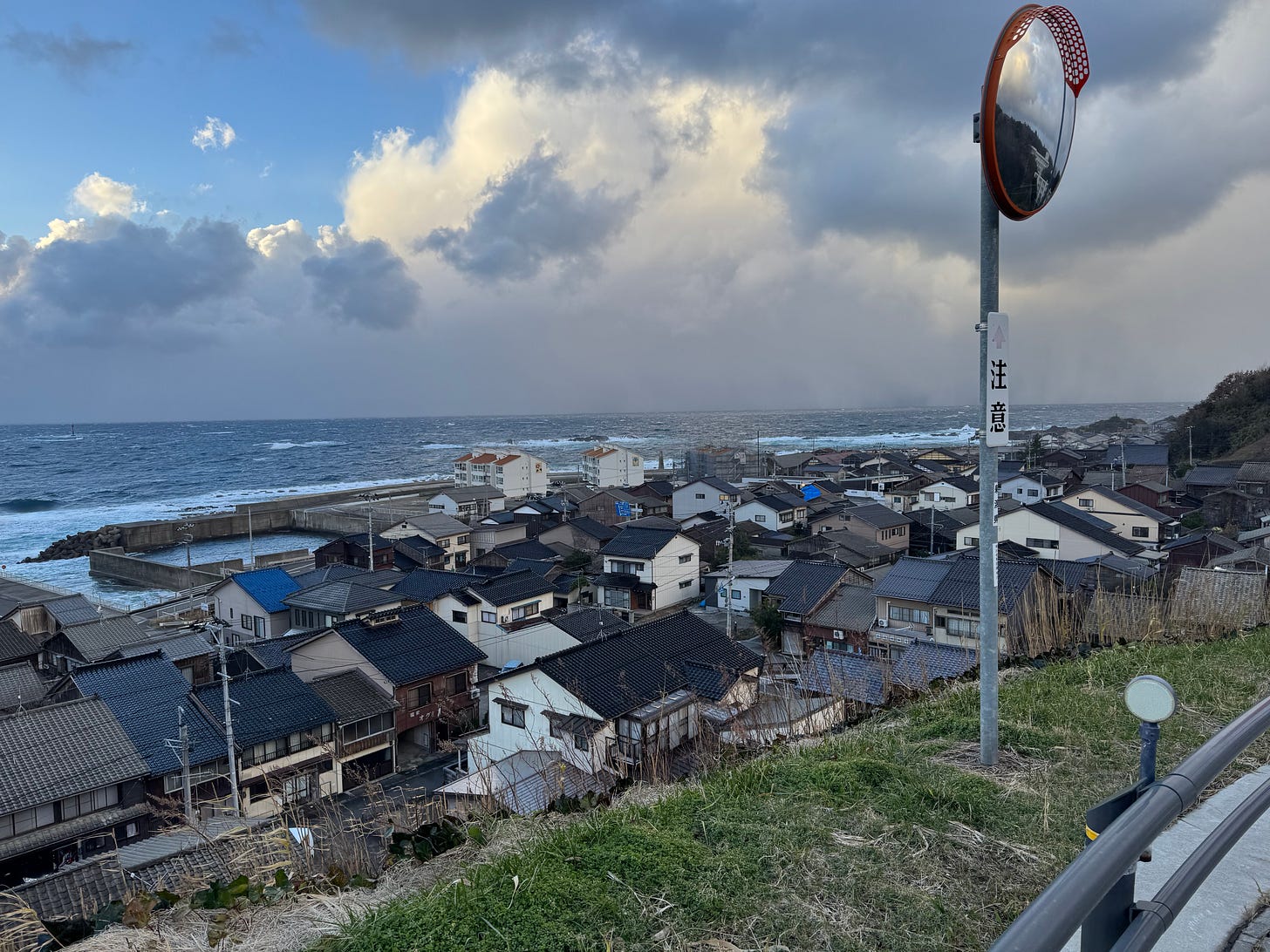





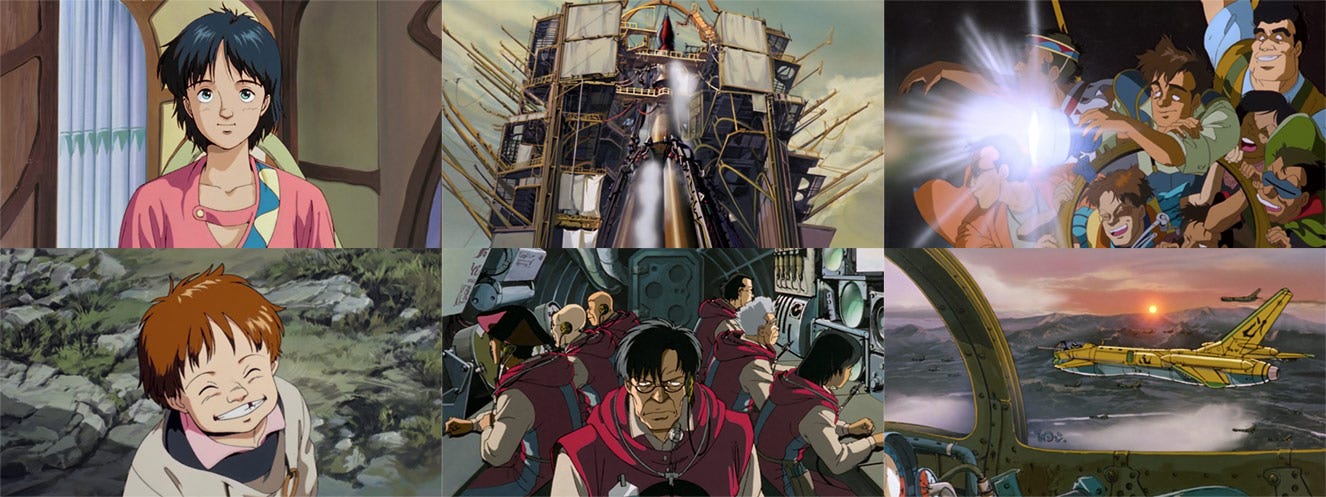

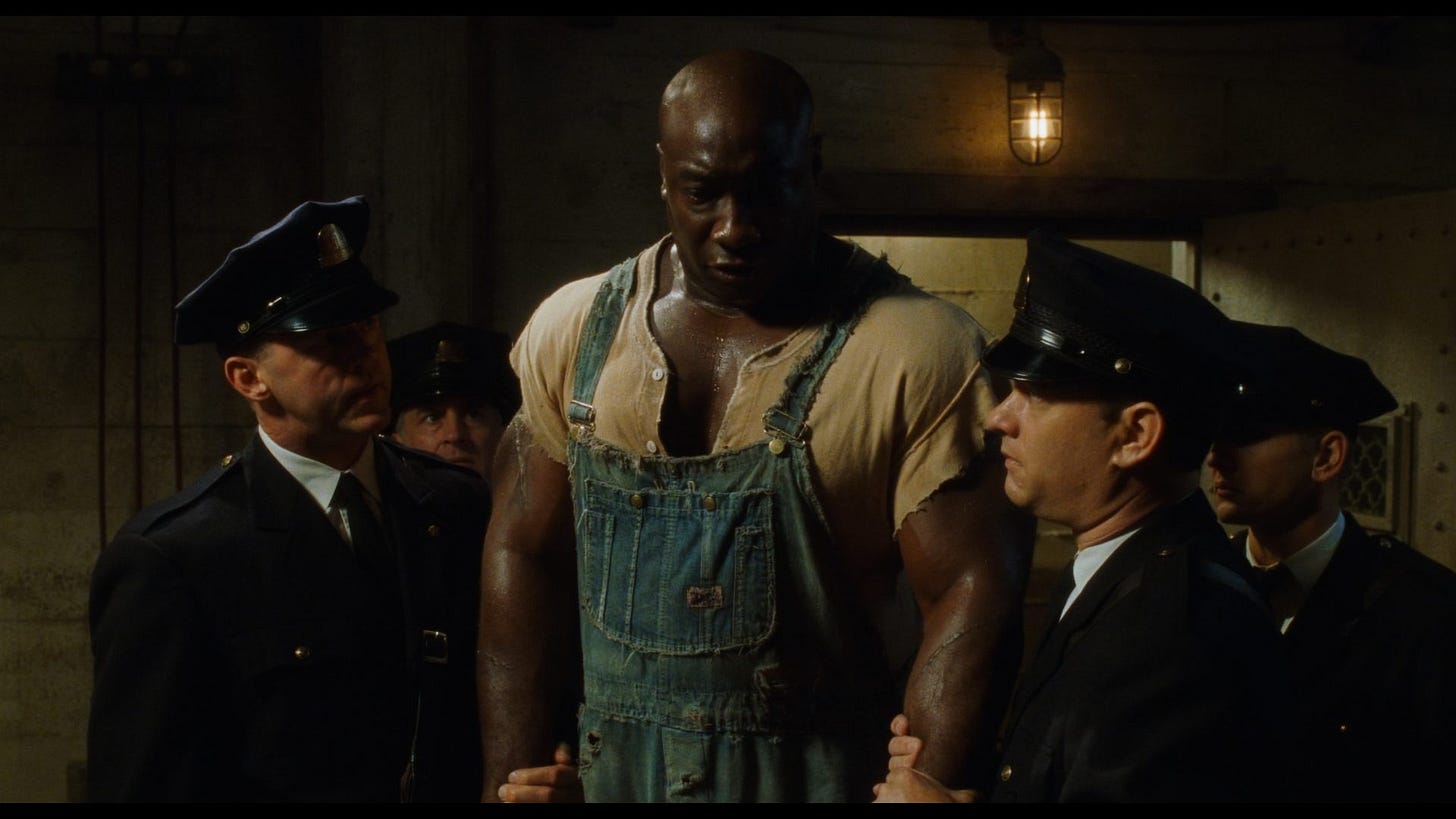


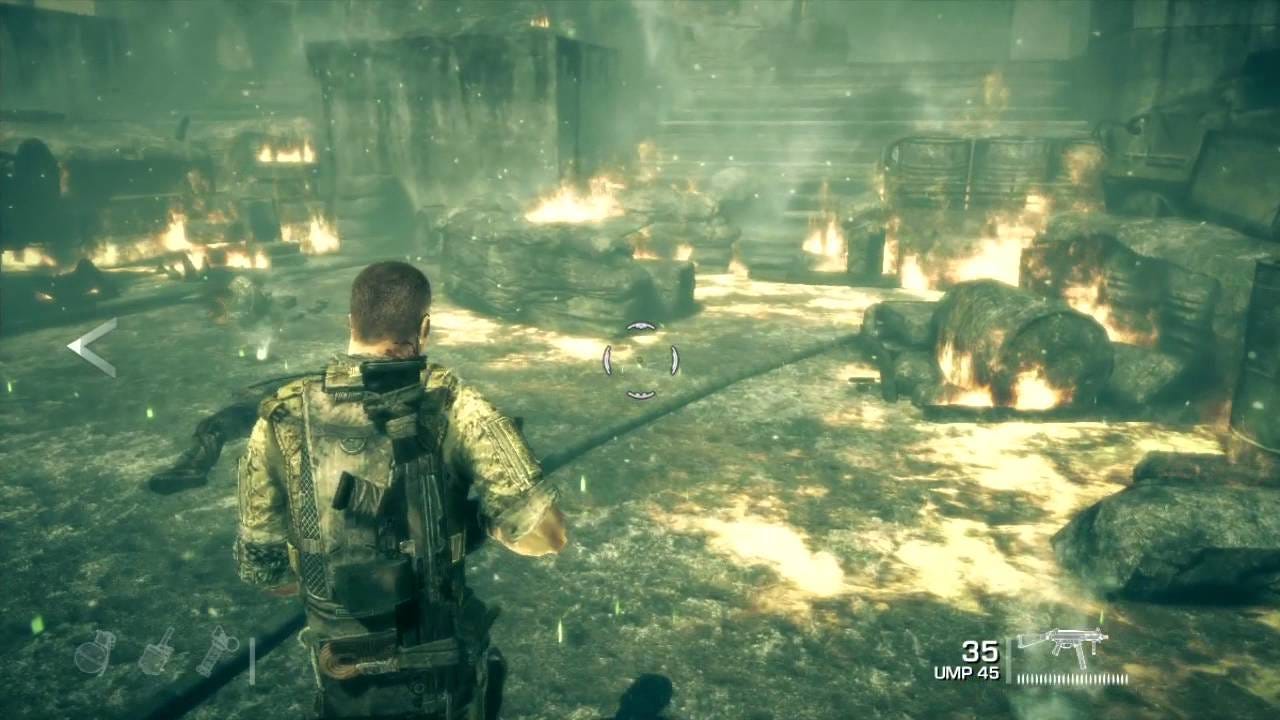

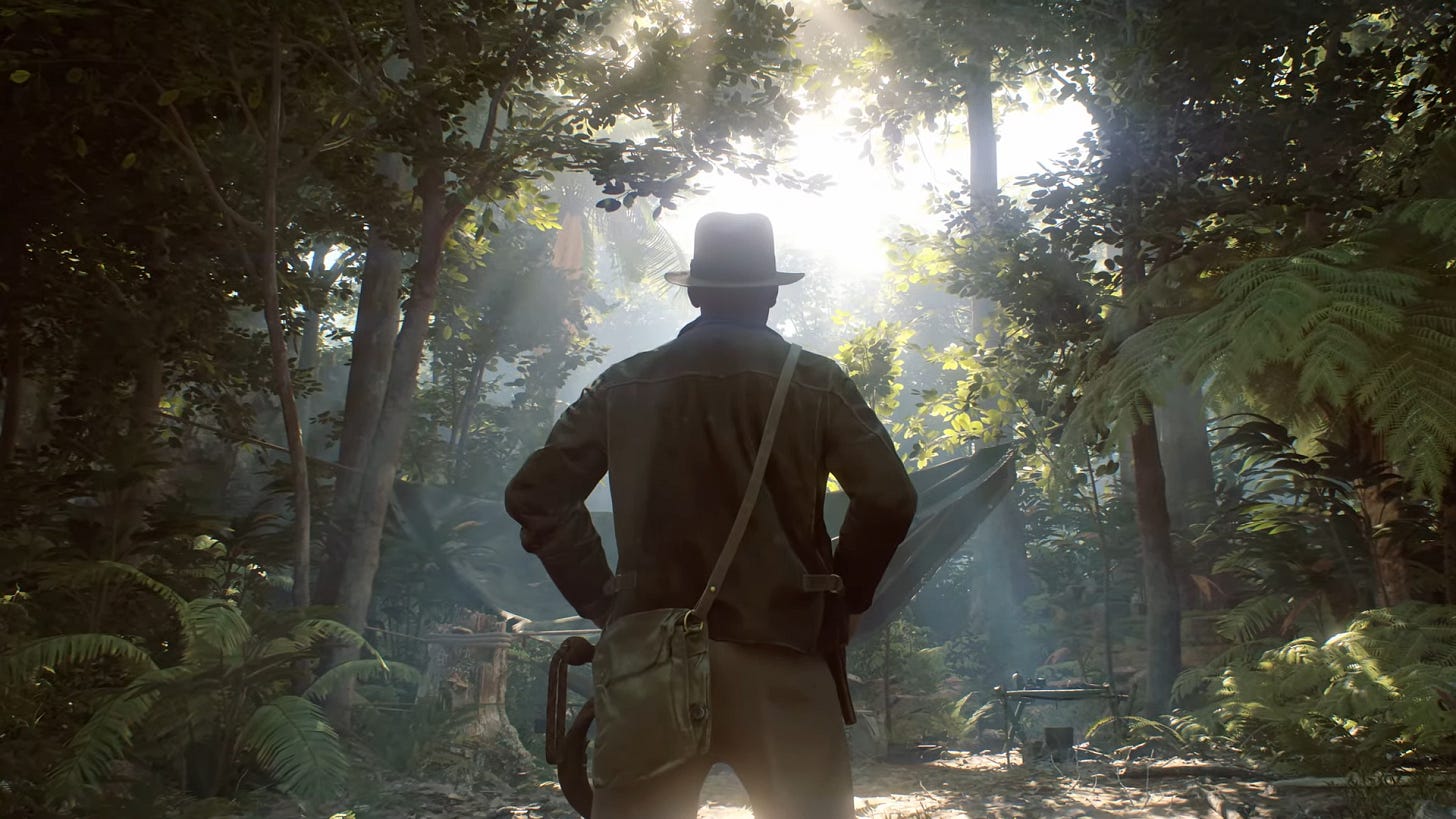
I loved reading this behind the scenes view of your year! Congratulations on what you accomplished and I will definitely be checking out these articles that you shared in this post!